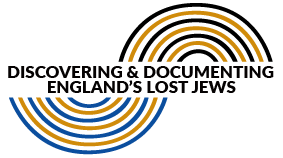Memories of Bevis Marks and other reminiscences
By Enid Jenshil (nee Da Costa)
I remember my father, Alfred Da Costa, telling me stories of his childhood. He was born in 1911 in Fulham, West London, and later moved to Thoydon Road, Bow, East London. He always liked to refer to that house as ‘Thoydon Towers’, though my mother’s description was rather more defamatory.
Father’s early life
He was one of eight children, two girls and six boys, born to Esther and Eleazar Da Costa (known as Alec – though always referred to in later life as “the old man”). It was a small terraced house with an outside toilet, and since my grandfather was an only child, his parents occupied one of the upstairs rooms as well. I can’t begin to imagine how difficult life must have been for my grandmother, and like many women of her generation, she loved going to the cinema, which must have been an understandable form of escapism for her. My father said that at bedtime they topped ’n’ tailed, which probably meant four kids to a bed. He said that when the boys got older and their friends used to come and play cards late into the night, you never knew who you would wake up in bed next to!
Portuguese roots
Our family tree can be traced back to Israel Gomes Da Costa, who was born in Portugal before 1675. His son, Abran Gomes Da Costa, was also born in Portugal in about 1700. Two generations after that, further records show London as the place of birth of Hananel Gomes Da Costa (15.5.1781), so altogether we can account for eleven generations of our family. Isaac de Aaron Gomes Da Costa (born 21.11.1800) married his cousin Esther de Hananel Gomes Da Costa (born 8.11.1800) and they had at least seventeen children, so it seems they were quite a productive family.
Life in London
Although geographically a very short distance from the East End of the Ashkenazi immigrant community, who came to escape the pogroms of Eastern Europe, the Da Costa family that my father and his brothers and sisters were born into, was a very one. My parents met when my mum, Yetta (Glazer), became friends with my Dad’s sister Kitty. My maternal grandmother was a widow with four daughters, so life was hard for everyone and money was scarce. My parents eventually married on 25 September 1941 at Bevis Marks Synagogue. My dad was on leave from the Army and I suppose there were very few men at the ceremony as all the brothers and brothers-in-law were serving soldiers. My mum wore a blue dress. There were no flowers, no photographs, no party and after the chupa, the people who were present went back to my grandma’s house for tea. My parents had rented a tiny two-room flat in Shoreditch, but never spent a night there as there were constant air raids over London and so they were always having to escape to the shelters.
Being married to my mum was quite a revelation for my dad. My mum’s family spoke Yiddish fluently, cooked and ate traditional Ashkenazi food, and celebrated the yomtovs and high holy days. My dad, on the other hand, had never learned Hebrew, had not had a Bar Mitzvah, and left school at 14 to go to work. My father enjoyed the culinary delights of married life, though for my mum it must have been quite a challenge producing lockshen soup and kneidlach one day, and roast beef and baked rice the next!
My uncle’s story
Things were rather different for my dad’s youngest brother, Ralph Da Costa, who is now 96 and living in Bournemouth. Uncle Ralph told me a little while back that, as a child, he used to sing in the choir at Bevis Marks. They paid him sixpence (in old money: 2.5p in new) a week, and every six months he would get a new pair of boots. I think the Shul must have had some very generous benefactors, as Ralph probably wasn’t the only one who got new boots.
When Ralph was in his twenties, he met Kitty Fox and decided he wanted to marry her. Kitty wasn’t Jewish but wanted to convert under the auspices of Bevis Marks. It took her about three years to learn all she needed to know, but still the Shul found reasons to delay her acceptance and sanction the marriage. They said that Ralph’s knowledge of Hebrew wasn’t good enough. My uncle had been a highly decorated paratrooper during the war, so telling him that was like lighting a blue touch paper. He told Bevis Marks that if they didn’t agree to the conversion and wedding, he and Kitty would go to a register office to do the deed. Shortly afterwards, Ralph and Kitty were married in Bevis Marks and I was their five year-old bridesmaid.
My parents’ demise
Sadly, my dad died in 1966 at the age of 55, so my mum was a widow for far longer than she was a wife. She passed away in 2014, in her one hundredth year. She remained a member of Bevis Marks Synagogue for the next 47 years, so that she could be buried next to my dad in the Spanish and Portuguese Cemetery in Hoop Lane, Golders Green.
